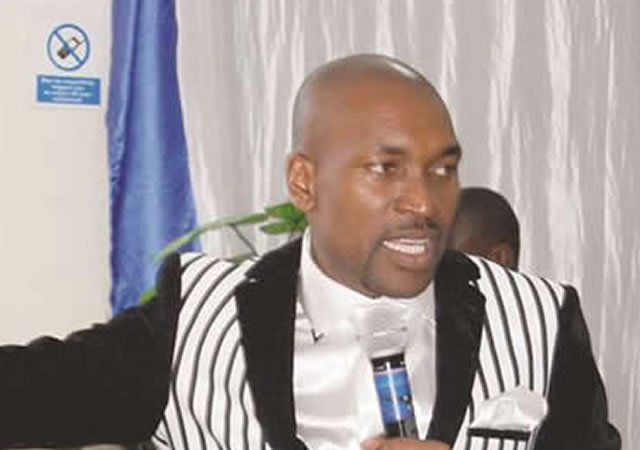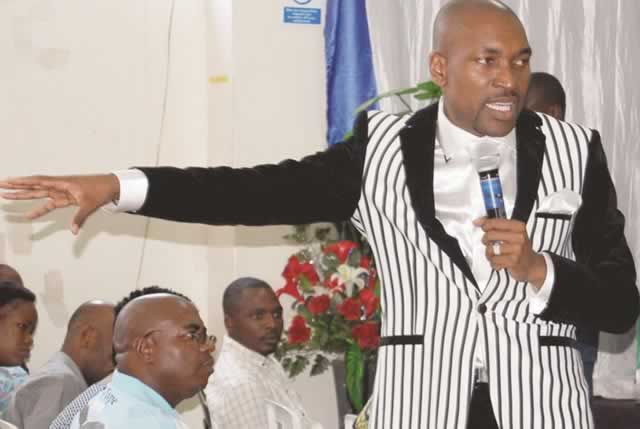Pastors should stick to their basic roles

Opinion Saul Gwakuba Ndlovu
A couple of weeks ago, a so-called pastor of one of Bulawayo’s Pentecostal churches, Dennis Hungwe, claimed to have successfully prayed for a miraculous recharging of pre-paid electricity for some people who had gone to him for prayers.However, he was soon thereafter reported by the media to be either denying ever saying so, or to be apologising for, he owned up, that he had lied.
This article is not about how such lies that give some Pentecostal churches that have been discredited because of such falsehood a bad image, but rather it is all about the seven roles of every genuine Christian church pastor.
The roles are praying, a basic duty of every pastor to thank God, to ask Him for guidance through the life’s ups and downs, to protect the congregants against temptations and misfortune, illness and the devil’s ever present endeavours against God’s people, as well as for a life of righteousness, wholesome happiness and well being.
Prayers are also meant to beg God for forgiveness for our sins and to praise him as the initial source of life and as its ultimate end – from birth to death.
Divining is a very controversial role as it is generally either misunderstood or abused
Simply and briefly explained, to divine means foresee or to conjecture or to predict. Very few pastors have the highly sacred power to see into the future.
Many Pentecostal and Zionist church leaders take advantage of the innocent ignorance of their congregations to tell them untrue prophecies. That is especially so in rural areas where people experience numerous cases of desperate illnesses and/or destitution and emotional distress.
Such situations lead to a very high level of gullibility which is taken advantage of by unscrupulous so-called pastors.
An extremely small number of pastors is endowed with the power to look even into the past, to say nothing about the future.
Were that not the case, the Gweru couple whose woman spent an excruciatingly painful seven years with a pair of surgical scissors embedded in her intestines could have been diagnosed by at least one of the numerous “prophets” and/or “apostles” the desperate couple consulted.
But it was a conventional medical doctor who used a modern medical piece of equipment to make the correct diagnosis.
While it is a basic constitutional right in Zimbabwe to consult whomsoever whenever it is necessary about whatever problem, it is not a right, moral, constitutional or legal, for those who are consulted to lie in the name of prophecy.
Preaching is one of the main functions or roles of pastors. Sermons may aim at conversion, or increasing the knowledge of the congregation about God and the Bible, or to re-affirm or strengthen the faith of the converted, or to correct a misconception or misconceptions about some aspects of the Christian faith, or to drive away or exorcise evil spirits, a role that is played also by prayer.
Healing is yet another role played by pastors. Referred to as faith-healing, this is one of the roles of Pentecostal churches that need to be explained to the ordinary people many of whom seem to think that all that is necessary is to kneel before a pastor who places his or her hand on the sick person’s head, then say a few words of prayer and, low and behold, the sick person is healed.
First and foremost, for one to respond positively to prayer, one should be a very faithful, born-again believer. Secondly, the pastor should be endowed with God’s power to heal the faithful. In connection with this practice, Jesus himself always told those he had healed through prayer that their faith had healed them.
There are cases that cannot, however, be healed by faith and through prayer. Wounds sustained through accidents or war cannot immediately heal because of prayer.
The injured may have to undergo a surgical operation and later physiotherapy in spite of prayers in order to be healed. However, the healing process would take a shorter period if one is a believer in God and is prayed for than if one were a pagan.
This brings us to a very controversial aspect of this matter: whether or not Pentecostal churches should use some of their funds to establish and run clinics and hospitals, or whether they should depend merely on faith-healing.
The opinion of the writer of this article is that they should certainly run their own health institutions. It is significant that many Pentecostal pastors go to either government or private hospitals when they are ill. Some of the hospitals are run by Christian churches such as the Roman Catholic, the Anglican, the Salvation Army, the Baptist, the Lutheran and the Dutch Reformed.
Instead of owning palatial residences, and super-duper motor vehicles, they should share their churches’ financial wealth with everybody by establishing and running social services facilities such as hospitals.
Another function of a pastor is aiding the destitute. This is particularly important in Third World countries where poverty is the norm, but where many Pentecostal church pastors wallow in massive wealth and some in unrestrained sensuality. Meanwhile, they minister to people who live from hand to mouth, being fed on elusive hope that God will salvage them from poverty one day.
These faithful later queue for food handouts offered by intellectual charitable organisations such as the Roman Catholic’s Caritas or the highly respected World Vision or some other such body. It is incredible that some of these pastors are actually chauffer-driven in motor vehicles that cost them $1 million or more. Their ostentatious lifestyles are obscene and ungodly.
Jesus Christ would not only shudder but sjambock such pastors were He to come back to review the church which He referred to as His body before He was crucified. St Paul would condemn such behaviour in words harsher than those he used in his Second Epistle to the Corinthians.
Formal education is one of the social services Christians are expected to give their flocks. It was extremely pleasing to learn a couple of months ago that one of Zimbabwe’s apostolic denominations had decided now to build schools for its members’ children. It had not been doing so all along. That decision is not only wise but most logical because for one to be an effective Christian, one should read and study the Bible; for one to read and study the Bible, one should be literate, and to be literate one should go to school. One’s denominational school is the best.
It is strange that children of some pentecostal pastors attend schools run by other denominations why? Because their parents’ churches have not got any. Is it not absurd that a child attending a Roman Catholic school where the Bible is the vulgate on Sunday attends a pentecostal service where the pastor’s sermon is from, say, The Good News Bible?
The final function of a pastor, any Christian pastor, is to be a good example to the entire community as well as to the whole nation at large.
The very first virtue of any pastor is truthfulness. A pastor’s word should be his bond, and telling or writing untruths should be utterly alien to a pastor’s life. Little wonder that, we should observe, the Swahili colloquially refer to Islamic muezzin as basema kwele (speaker of the truth.) Another quality of a pastor’s behaviour is patience as he struggles against evil. While he does his utmost to win the people’s souls for God, he should understand and appreciate that in some cases it takes much longer to succeed than in others. Perseverance is the key.
An exemplary pastor is non adulterous, non-ostentatious, non provocative in word, thought and deed, non-bellicose and most appreciative of what is good and righteous.
Like every good Christian, an exemplary pastor is not only respectable but also respectful. The old saying: “Example is better than precept” applies most appropriately to pastors, parents and guardians particularly Christians.
Saul Gwakuba Ndlovu is a Bulawayo-based retired journalist. He can be contacted on cell 0734328136 or through email [email protected]









Comments